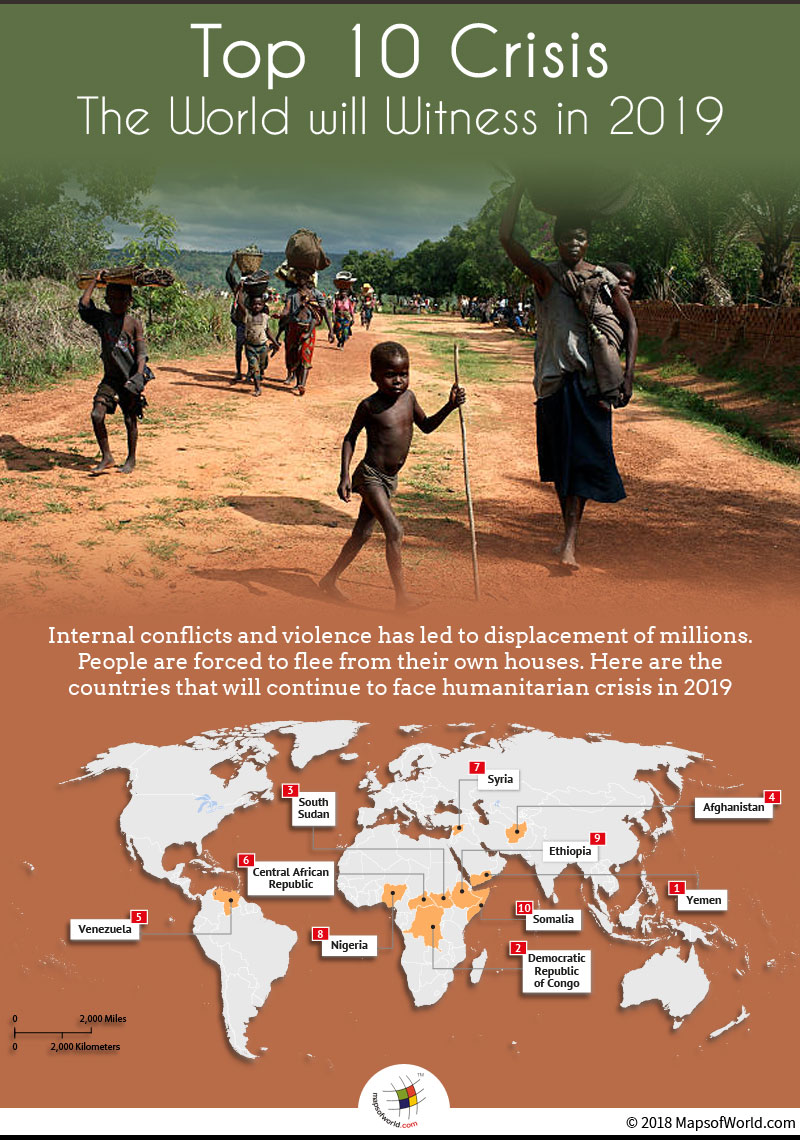What Countries will Face Extreme Crisis in 2019?

Lucky are those, who are living in a stable economy and can have meals any time of the day. The year 2018 was quite devastating for millions of people around the world. Man-made crisis, internal conflicts and violence has led to displacement of millions. Imagine being forced to run away from your own homes! International Rescue Committee has listed countries which are on the brink of facing worst humanitarian crisis ever. Here we bring you Top Ten which account for two-thirds of entire refugee population across the globe:
Somalia
Since decades, the country in Africa has been plagued with conflicts. Tribalism is one of the major reasons behind the Somali civil war. Every Somali wants to know if the political party will think about their “clan.”, and represent their “identity.” Different groups in Somalia fight for their rights on the limited resources available in the country. More than 2.6 million Somalis have been internally displaced in the country. Major Al-Shabab resurgence is unlikely, and the circumstances may continue to worsen in the year ahead.
Ethiopia
The United States military operation to combat militant Islamism and piracy has caused ongoing conflict in the country of Ethiopia, since 2002. The operation is referred to as ‘Operation Enduring Freedom-Horn of Africa (OEF-HOA)’. The tensions however escalated in 2018 when Prime Minister Abiy took charge and introduced certain reforms. Supporters of the Oromo Liberation Front (OLF) had placed their flag in parts of the city, and it was perceived that they are attempting to take control of the capital. Political concerns owing to ethnic variations, people displacement, and food security concerns are likely to remain in 2019.
Nigeria
The Christian-Muslim strife in Nigeria can be traced back to 1953. It is sometimes shocking to witness that even today religious violence occurs in some countries, so much that over 2 million people are displaced in their own country. Boko Haram insurgency aims to impose Sharia in the northern parts of Nigeria – which has been the major cause of conflicts. Communal violence isn’t the only cause for bad circumstances, but there is also food and water insecurity in the nation. The upcoming presidential election of 2019 could also have a destabilizing impact, resulting in even major conflict.
Syria
It was in 2011 that protests broke out in Syria, against the government. Since then, the country has only witnessed war and collapse of educational and health services. It has emerged into a multi-sided armed conflict. The Ba’athist Syrian Arab Republic led by President Bashar al-Assad, and its allies have been fighting against various domestic and foreign forces – which are also opposing both the government and each other. The airstrikes and attacks have caused major infrastructure devastation and refugee crisis in the country.
Central African Republic (CAR)
The country has witnessed persistent instability since December 2012, when Séléka- a new coalition of varied rebel groups overthrew the government by taking control of many towns. The rebel leader Michel Djotodia had declared himself president by March 2013. The major tensions are regarding religious identity between Muslim Seleka fighters and Christian Anti-balaka, in addition to historical enmity. Till now, over 1.1 million people have been displaced from their homes, from the 5 million which is the overall population in the country. The conditions remain threatening, and conflicts will be prevalent next year.
Venezuela
The economic and political crisis prevailing in Venezuela is one of the worst crisis ever witnessed in the Americas. In June 2010, President Chávez declared an “economic war” because of increasing shortages in Venezuela. It has been observed that the crisis is a result of populist policies that began under administration of Chávez. Life of an average Venezuelan had been affected on all levels, and by 2017, 90% of the population was in poverty. The country also sustains one of the highest murder rates in the world. Unless the government introduces effective economic reforms, the crisis will continue to prevail in Venezuela.
Afghanistan
The intensifying Taliban insurgency and emerging Islamic State threat has made Afghanistan even more vulnerable, than it ever was. Taliban militants have controlled the territories and the conflicts are ever-rising. The conflict had begun with U.S.-led coalition in 2001. The elections to be held in 2019 may invite Taliban violence and the displacements are likely to increase. The food insecurity could also rise.
South Sudan
The country gained independence in 2012, but what lied ahead was years of civil war. About 400,000 have been killed in the fight between the government and the opposition forces. Violence that persists has led to displacement of over 1.96 million people, while 6.1 million people also face food insecurity. In 2019, South Sudanese would continue to struggle to get enough food. Humanitarian concerns may drastically rise if another peace deal collapses.
Democratic Republic of Congo (DRC)
DRC is extremely wealthy, enriched with diamonds, gold, copper, cobalt and zinc. But, these resources have not benefited the people of the country, as they suffer from issues like food security as well. These resources have only attracted corrupt governments, vicious warlords and unprincipled corporations. The conflicts in the country have led to displacement of over 13.1 million people, and continued political disagreements, protests and militia violence is likely to be the scenario of the nation in 2019 – while Ebola continues to spread.
Yemen
Home to the worst cholera outbreak, Yemen is home to 24 million people in dire need of humanitarian assistance. As per the United Nations, 13 million civilians in the country face starvation, and the food insecurity continues to rise. The conflict had begun in 2015, as the Saudi and Emirati-led coalition supports President Hadi, against the Houthi movement which has controlled Sanaa. Now, even the US has decided to withdraw its troops from Yemen. Airstrikes continue to hit the country, and it will continue to remain difficult for humanitarian organizations to deliver aid.
Know more:


